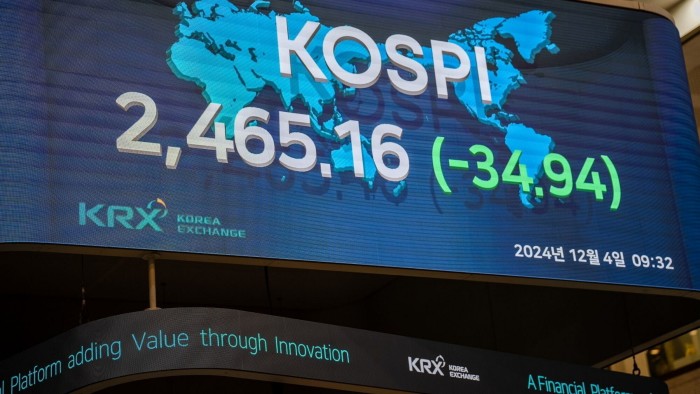Unlock the Editor’s Digest for free
Roula Khalaf, Editor of the FT, selects her favourite stories in this weekly newsletter.
South Korean officials stepped in to shore up support for the country’s financial markets as investors braced for political uncertainty after President Yoon Suk Yeol’s failed attempt to impose martial law.
Kim Byung-hwan, head of the country’s top financial regulator, said the government was ready to activate a Won10tn ($7.1bn) stock market stabilisation fund and a Won40tn bond market stabilisation fund if needed.
“We will closely monitor the foreign exchange soundness of financial institutions and respond to risks, such as margin calls triggered by rising exchange rates, through foreign currency liquidity provision via securities financing,” Kim said in a statement.
Kim urged institutions such as the stock exchange to focus on stabilising investor sentiment. “Given the heightened market volatility, even small incidents can amplify anxiety,” he said.
His comments come amid mounting calls for Yoon’s impeachment after his failed attempt to impose martial law triggered the country’s worst constitutional crisis in decades.
A successful impeachment by opposition parties that control parliament would trigger a snap election and prolong political uncertainty in Asia’s fourth-largest economy.
The country’s Kospi stock benchmark was down 1.4 per cent on Wednesday, while South Korea’s won strengthened 1.2 per cent against the dollar.
The muted market reaction reflected Yoon’s about-turn on martial law, said Thomas Matthews, head of Asia Pacific markets at Capital Economics.
Some energy stocks fell, reflecting anxiety that a successful impeachment could result in an election and victory for opposition leader Lee Jae-myung, whose party has been sceptical on nuclear power.
“Nuclear power stocks were smashed today,” said Sanjeev Rana, head of Korea research at CLSA. Shares of Doosan Enerbility, which builds nuclear power plants, dropped more than 10 per cent.
South Korean equities have underperformed relative to other markets as the country has struggled to roll out reforms to end what some investors call the “Korea discount”. “There’s a lot of bad news already priced in . . . for what is otherwise a pretty stable, wealthy democracy,” Matthews said.
Bond prices were largely stable, with yields on two-year government debt rising 0.12 percentage points. Yields on 10-year bonds edged up 0.01 percentage point, while the 30-year bond was flat. Bond yields move inversely to prices.
Shares of Samsung Electronics, South Korea’s most valuable listed company, were down 1.3 per cent.
South Korea’s finance minister Choi Sang-mok said on Wednesday morning that the government would deploy “unlimited” liquidity to stabilise financial markets if needed, while the Bank of Korea’s monetary policy board held an emergency meeting and said it was “keeping all options open until the markets stabilise”.
The central bank expanded the scope of market operations as it intensified attempts to maintain liquidity and stability, increasing the number of securities eligible for open market operations.
It also began irregular repurchase agreements to “expand short-term liquidity supply” and increased the number of institutions eligible to trade repurchase agreements.
Read the full article here

